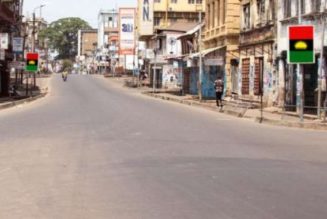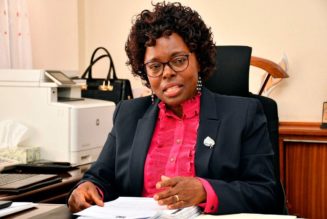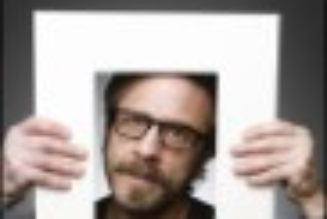Profiles
Chris Getonga: The ‘crazy’ half-Indian serial entrepreneur
Friday May 05 2023
End Malaria Council Chairman Chris Getonga during an interview at Serena Hotel, Nairobi on May 3, 2023. PHOTO | BONFACE BOGITA | NMG
Chris Getonga sounds like a famous radio host in the 60s who announces the death of presidents. Deep baritone-d and articulate, his voice fills your bones.
“When a popular TV station was setting up shop many years ago, they asked me to be a newscaster, but I turned it down” he quips, tongue-in-cheek, “I just didn’t have enough shirts.”
What he doesn’t turn down, though, is an opportunity to start businesses. He started Acacia Medical Center and ran and sold it.
He then started Mimosa Pharmacy and sold it. Now it’s Goodlife Pharmacy. He is now in a frozen food manufacturing company called Sous Chefs while also chairing End Malaria Council.
He is also the kind of fellow who casually uses the word “nigh” in conversation.
I read somewhere that you studied Math?
Yeah. I did my first Financial Maths degree in the US, came back here then went to England to do chartered accountancy.
I didn’t finish it because I was not cut out for that. I mean, I just didn’t want to be sitting at a desk. Then my dad passed on, I was 26 years old.
My younger brother who was studying in England had just come back to get married, so I grew up fast. There have been ups and downs, the ups have been really up and the downs have been down. But I had my mom’s support, she passed on last year.
How do you feel now when you see a Goodlife Pharmacy store?
Pride. It’s run very professionally, which is always what I’ve tried to do in all my businesses; don’t cut corners, do things the right way, and buy from the right people.
They have grown tremendously since they bought the business. I started Mimosa Pharmacy at Nairobi’s Junction Mall.
It was the first pharmacy of its kind in Kenya where you could walk in like a supermarket and touch and feel products.
Then we started opening branches in malls which were coming up faster than we could open. [Laughs] We did well, seeing 1,000 customers a day.
Your initial businesses were in health yet that’s not what you studied.
I wanted to be a doctor. My mother was a nurse and on weekends we’d go to the clinics where she was working.
When I mentioned I wanted to be a doctor she said, ‘No please, Chris, I know your character, you’ll not be happy, and doctors don’t have a life.’
But when I came back from the US, when she retired, she opened a little pharmacy in downtown Nairobi, just near River Road.
From that little pharmacy, she was able to educate her three children abroad. My father was a civil servant but I think she made more money than him every month.
She was a very hard-working woman. Amazingly, everyone knew her. She was Indian, the first Indian to marry a Kenyan, that was over 60 years ago.
You’re half-Indian?
Yeah. Can you imagine?
Oh, I just thought you’re just a real light guy…
No. And I knew she was Indian when I was 12 years old.
What do you mean?
Because she used to perm her hair. I assumed she was just light. My father did his first law degree at Makerere University, then the second one in India.
You know, before independence some Kenyans went to India, some to the US, and others to Russia. He was taken by the Indian government because he had been arrested.
He was also a writer. While doing his law degree in Delhi, he met my mother. She was a nurse. I always say she must have been a bit of a naughty girl to be with a black guy in those days.
Wild. An outlier.
[Chuckles] Yes completely. So then he comes back to Kenya because I guess independence is nigh. He tells her, ‘Let’s get married’ and she replies, ‘No, I don’t know if you guys have more than one wife there in Africa…I don’t know Africa.’
She said, ‘If you want me and you still love me, you write to me after one year, and I’ll come.’ So that’s what he did.
He wrote to her and she came by ship. He met her at the port. My father was a DO {District Officer}, I think in Murang’a. He took her to Murang’a, and they got married in Nyeri.
I was born and then the next thing we knew she was pregnant with my brother. She said, ‘Oh gosh, now I can’t go back to India even if I wanted to.’ [Chuckles].
I mean, can you imagine her going back home with, not one but two black children? So she decided to raise her children as Kenyans.
This is all so fascinating, really. So how did you discover she was Indian?
When I was 12, I fought in school. I went to Hospital Hill. This child called me a chotara [mixed breed] and I just knew that wasn’t a good word. [Laughs]
So, of course, my father came to pick me up from the headmaster’s office and as we were driving home he asked what happened. I said David had called me a chotara.
He said, “Yes, that’s somebody who is half Indian and half African. I asked, “Who is Indian?” [Laughter] He said to himself, “I’ve been telling your mother we need to have this discussion.” (Laughter).
So you went home and they sat you down…
Yes. They told me the story. Of course, at that time there were a lot of children born of mixed marriages, primarily African-mzungu.
But they seemed at the time to congregate together. And my mother didn’t want that. She wanted us to enter mainstream Kenya, which I guess was forward-thinking.
Did she ever tell you what she had to go through to sort of assimilate?
Yes, a lot of Asians coming into business knew her because she could speak the dialects. She was a Christian and a Goan.
So I would say she had a lot of support from that community, and then my father’s family, who are from Nyeri, were also very supportive of her.
They embraced her completely, and even now, we are very close. We have very close-knit cousins and all that.
What impact do you think this racial equation had on you?
I think it made me. I have never really given it serious thought. [Pause] It’s only now that we are talking about it that it occurs to me that half of me is Indian.
It’s not something that I think about, it’s just who I am. I don’t see it, some people might see it. My wife works for the UN but she’s from Guyana, South America.
End Malaria Council Chairman Chris Getonga during an interview at Serena Hotel, Nairobi on May 3, 2023. PHOTO | BONFACE BOGITA | NMG
She considers herself Caribbean because they speak English. I remember when I first went to New York with her, almost 18 years ago to meet her family, her brother opened the door and the first thing he shouted over his shoulder was, “You didn’t tell me Chris is a Dougla,” which in the Caribbean means somebody who is half Indian, half black.
They can see by the complexion, the hair, or something. So I asked her, “What is a Dougla?”
She asked me, “What were you expecting? Are you expecting [to be seen as] that African you’ve been preconceived to imagine you are? Walk in with a loin cloth, big, buff.
A Mandingo?
A Mandingo, yes. [Chuckle].
Do you have any connection with your mother’s side of the family?
Yeah. I’ve been to India about maybe three times but most of my family has since moved. Some went to England and others to Australia and Canada for economic reasons.
So I have cousins in all those countries. I talk with my cousin in Canada at least once every two weeks. He comes here with his family.
My family hasn’t seen the ones in Australia. Hopefully next year or late this year we’ll go there to see them.
So, a half-Indian- Kikuyu fellow marries a Caribbean lady from Guyana, which makes your children’s heritage very rich and interesting. Are they curious about their roots?
I have one daughter. Only one daughter. She’s 13. Here, let me show you a picture. [Shows photo of a girl baking in a kitchen]. My daughter is a very good cook, so is my wife. My daughter is quite tall, very tall.
How old are you now?
I’m 61 years old.
Looking good for a 61-year-old man. You got your daughter very late in life; at 48?
Yes, quite late. There were complications along the way, you know how it is with these things. We had a boy who lived for two months and then he passed away. He didn’t have enough oxygen.
God has His way. But then we now have Zuri and we love and cherish her. It’s impossible to imagine life without her.
That’s quite heartfelt. You lost your dad so young, he must have also been young in his, what, 50s?
Yeah. He was about 56. He had lupus but at the time they didn’t know. Lupus is a degenerative disease. Things happened so fast.
My dad was a quiet, value-driven man. He was then the town clerk in Nairobi, but we didn’t even have a plot, can you imagine? [Laughs]
His death made me grow up quickly, fend for myself and also be a ‘father’ to my younger brother. I started Acacia Medical because of my dad’s illness, I wanted to set up a chronic illness centre.
What drives you to all these businesses and what have you learned?
I don’t really know what drives me. It’s crazy. My wife sometimes thinks I’m crazy. [Laughs] Maybe I like the challenge. Maybe I am crazy. [Chuckle]
What I have learned, though, is resilience. That and relationships; nurture them well, no matter what. Answer all your calls. I only have one phone and one number that I’ve had since 1988.
My dad always stressed integrity, that when you have it you can keep your head up and not look over your shoulder. He was a man of honour.
How is it losing your mom? That changes everything.
I would say she died at 85. For the last couple of years, she lived with me, because I had a younger brother who also passed away three years ago.
So I have one big brother left called Alfred. My brother’s death sort of shocked her because she was very close to him. She just became quiet. I asked her to come live with me.
It was good having her home, and my wife, I would say, was a good daughter-in-law. She had a comfortable life, and lacked for nothing, until the end when she had a heart attack.
But it’s still a shock to lose your mother, no matter what age they are. She had a good life. My father never saw his children marry or start families. So yeah, she had a good life.









